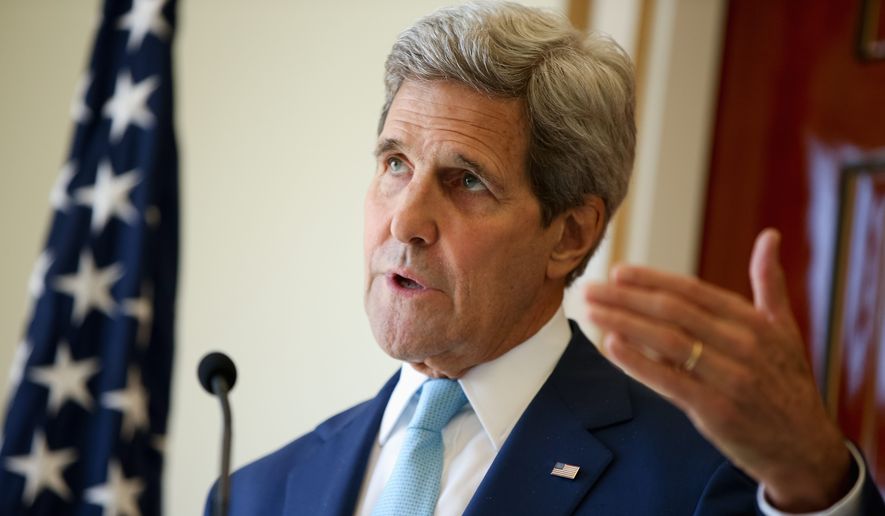Secretary of State John F. Kerry hopes to focus ending Syria’s war when he meets Tuesday with Russian President Vladimir Putin, but will steer clear of trying to “normalize” U.S.-Russia relations in his first face-to-face meeting with the Russian leader since relations plummeted over the confrontation in Ukraine.
State Department spokeswoman Marie Harf pushed back Monday against Moscow’s assertion that Mr. Kerry’s trip to the Black Sea resort of Sochi is meant to ease bilateral tensions that have soared since the Russian annexation of Ukraine’s Crimean Peninsula last year and continuing support of pro-Moscow separatists in eastern Ukraine.
Russia’s Foreign Ministry said in a statement Monday that Mr. Kerry’s visit — falling just days after Moscow showed off its military might in massive World War II Victory Day parades — will “serve the cause of normalizing the bilateral relationship that largely defines global stability.”
The ministry blamed the recent coolness on “Washington’s deliberate unfriendly actions, saying Obama administration officials have “unjustifiably blamed Russia for the Ukrainian crisis, which was largely provoked by the U.S. itself.”
Mr. Kerry hopes to keep the Ukraine situation separate from his push for a new dialogue with Mr. Putin over Syria, U.S. officials said Monday.
“This is part of our ongoing effort to have these lines of communication, to talk about all of these issues, where we agree, where we’re working together, but also where we disagree, like on Ukraine,” said Mrs. Harf.
SEE ALSO: Export-Import Bank supporters rally to save bank
But critics say Mr. Kerry goes into Tuesday’s talks at a strategic disadvantage on both Ukraine, where Mr. Obama has refused to give Kiev heavy weaponry, and Syria, where Russia’s backing of embattled Syrian President Bashar Assad appears unshakable.
“I don’t think we’re going to see a diplomatic breakthrough from this visit,” said Anna Borshchevskaya, a Russia scholar at the Washington Institute for Near East Policy.
Mrs. Borshchevskaya said the U.S. outreach on the Syrian crisis in particular has gone nowhere.
“What Moscow has been doing is taking advantage of our lack of a long-term strategy in Syria, and our inconsistency and wavering, to allow Moscow’s position to prevail as the only option,” she said. “And Moscow’s position is to keep Assad in power, and I think it’s also in their interest to keep the Syrian opposition divided.”
Ms. Harf said Monday Mr. Kerry aimed to draw Mr. Putin and Russia’s Foreign Minister Sergey Lavrov into an renewed Obama administration push toward using diplomacy to engineer “a political transition in Syria,” eventually easing Mr. Assad from power.
Obama administration spokesman Josh Earnest argued that there is precedent for Washington and Moscow to work together on Syria — citing their work over the past two years on an effort to remove and destroy Mr. Assad’s chemical weapons arsenal and Russia’s role in the U.S.-led talks on a nuclear deal with Iran.
SEE ALSO: Obama: Free community college in ‘everybody’s interest’
While critics say Russia has risked undermining the talks by pursuing nuclear power plant deals with Iran and the recent plans to unfreeze the sale of a sophisticated missile defense system to Tehran, Mr. Earnest said Moscow has “been an important partner in putting in place the sanctions regime that has compelled Iran to the negotiating table.”
“We have been appreciative,” he said.
Mr. Kerry’s trip marks only his second visit to Russia since taking office — the first having come in May 2013 before war broke out in eastern Ukraine.
The U.S. and the European Union have imposed a slate of economic sanctions on dozens of Russian business and political leaders over the past year, while Moscow says it’s Washington that’s fueling the conflict by backing Ukraine’s military and a pro-Western government in Kiev. In late April, U.S. troops began engaging in joint training exercises intended to help bolster Ukraine’s defenses, sparking outrage from Russia.
While Ukraine’s military signed a February cease-fire with pro-Russia separatists in the east, fighting has continued sporadically during recent weeks.
During a visit to Moscow on Sunday, German Chancellor Angela Merkel urged Russia to use its influence to persuade the separatists to abide by the cease-fire.
Mr. Kerry is likely to make a similar push during his meeting with Mr. Putin on Tuesday.
• Guy Taylor can be reached at gtaylor@washingtontimes.com.




Please read our comment policy before commenting.